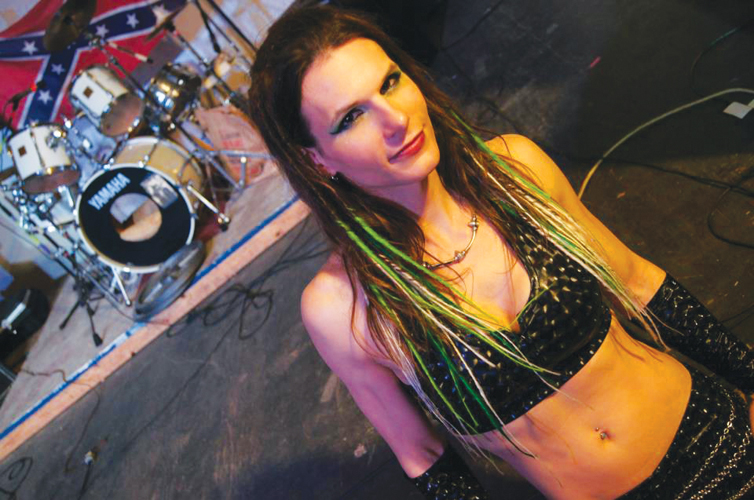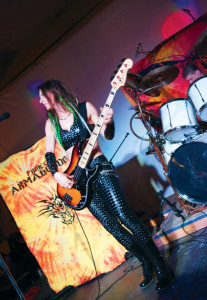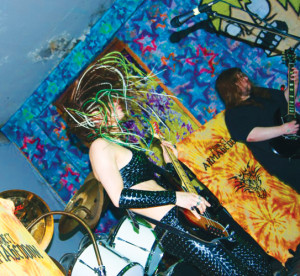Alexis Hollada

Houston’s transgender metal goddess.
by Jef Rouner
It’s hard to think of a more stereotypically male music genre than heavy metal. The scene is full of folks like Lemmy Kilmister and Dave Mustaine screaming full-throated rage and sex anthems in wide aggressive stances, daring you to escape from their concerts with your hearing intact. By definition, it is the music of tough guys, bikers, and the like. The few women who have made a mark in metal tend to be eye-candy fantasy vixens who play to the same fantasies their male counterparts conjure up.
In such an environment, you might think that a transgender person would face a wall of opposition, negativity, and attack. In the case of Alexis Hollada, you would be wrong. She and her band, Project Armageddon (in which she uses the stage name Doomstress Alexis), have steadily risen through the ranks to become one of Houston’s best metal acts, and her status as a transgender frontwoman has made her more of an object of support and adoration than scorn.
“I’m very open about it,” says Hollada via phone. “I mean, I don’t open my conversations with, ‘Hi! I’m Alexis and I’m transgendered,’ or anything, but I don’t hide it at all. The vast majority of the people that I talk to after shows have never met a transgendered person before, and I’m happy to erase stereotypes. Show that we’re not an alien race. We’re just people.”
Hollada grew up around music, and idolized her older brother who was a major metal fan. He would make her tapes that she would wear out, and she drew her first audience in kindergarten when she would sing Judas Priest’s “Some Heads Are Gonna Roll” during recess. As she grew older, she turned her appreciation for Black Sabbath and Iron Maiden into a creative drive of her own, teaching herself guitar at the age of seventeen.
But a love of music and a desire to pursue it as an occupation wasn’t the only thing Hollada was experiencing as a teenager. It started in the sixth or seventh grade, when Hollada began to come to terms with the fact that she was responding more to advertisements meant for women than those meant for men—especially the ones for clothes. She wanted to cross-dress, but feared being considered abnormal in the small town she lived in outside of
Cleveland, Ohio.
It wasn’t until Hollada moved to Houston that she actively began asserting her female identity through attendance at fetish events.

“People were so open at these places, and weren’t judging,” says Hollada. “Getting involved in that scene and experimenting helped me. As time went on, I became comfortable with being obsessed with being this person in that environment.”
Though she started out as a guitarist, Hollada eventually evolved into a bass player. Her home was a frequent jam spot for fellow musicians, none of whom could play bass, so she became proficient with the instrument out of necessity. Eventually the bass—along with her operatic, wailing voice—became her primary instrument, and allowed her to emulate her personal hero Steve Harris of Iron Maiden, who in addition to his bass playing is the primary songwriter for the famous metal act.
Hollada founded a band called Anathematize, playing operatic metal at Zelda’s to small crowds of friends—but it’s her current work with Project Armageddon that is taking off. The band is a stripped-down doom metal act that calls to mind classic epics like Sabbath’s “War Pigs.” They released their debut album Tides of Doom in 2011, and it was eight songs of pure, unbearable desolation that showed tremendous promise.
For a band that sports only three members, Project Armageddon has a very big sound, though it remains curiously empty to echo the themes of religious destruction and natural devastation that form the core of the band’s lyrical themes. Hollada oversees a host of apocalypses throughout the sprawling compositions, and her songs have a bold simplicity and redundancy that heightens the hopelessness, rather than using bloated tunes with needlessly intricate progressive solos.
That’s not to say that her bandmate Brandon Johnson doesn’t work wonders with a guitar line, or that drummer Raymond Matthews can’t craft intricate thunder. They most certainly can, but Project Armageddon speaks best when it hurls its slow, baldly stated prophecies at the listener.
 Though her Nostradamus-like verses are stellar, it’s the strange, Philip Glassian instrumental tracks that pepper Tides of Doom that stand out. “Call to Piety” and “Upon Solace’s Shores” are brief, ambient gems with a distinctly Celtic flavor, serving as needed breathers from assaults on the senses like “Into the Sun” and the title track. Moments like this bring to mind the neo-folk brilliance of bands like Awen, and are a part of what gives Project Armageddon an edge over more traditional metal acts.
Though her Nostradamus-like verses are stellar, it’s the strange, Philip Glassian instrumental tracks that pepper Tides of Doom that stand out. “Call to Piety” and “Upon Solace’s Shores” are brief, ambient gems with a distinctly Celtic flavor, serving as needed breathers from assaults on the senses like “Into the Sun” and the title track. Moments like this bring to mind the neo-folk brilliance of bands like Awen, and are a part of what gives Project Armageddon an edge over more traditional metal acts.
That edge has led to some great opportunities. Hollada and her boys play regularly all over town to increasingly larger crowds, and they’ve toured Texas once already. SXSW invited them to participate, as did 420 Fest, and more touring and recording is on the horizon. Hollada has also signed a deal with fashion designer Suzi Fox, who crafted a custom vinyl outfit for her appearance at SXSW based on a Project Armageddon fan contest where Facebook users could vote on the type of outfit to be crafted. Shiny black vinyl won by a comfortable margin.
Not everyone, though, accepts Hollada as a transgender figure in the metal community, regardless of talent. She’s been the victim of cyber attacks from other figures in the international metal scene, based entirely on her gender identity and not on her playing or singing. In all of these instances, Hollada’s fans have rallied behind her to heap scorn on bigoted messages and comments left on Facebook.
One particularly vicious assault came from Kurt Van Lifeson of the Toronto-based Free Range Humanz, who inundated Hollada’s Facebook page with hate speech. More than two hundred metal fans from Houston and beyond, including many fellow musicians, responded with hundreds of comments offering encouragement and support. The gestures, especially from so many non-trans peers and acquaintances, left her deeply moved.
“Dude was trying to cut me down, belittle me through his prejudice, and all it did was put me in a spotlight,” says Hollada.
More than anything, Hollada hopes to use her openness, and the acceptance of her transsexuality, to inspire others who feel intimidated or ashamed. She was hesitant to fully begin transitioning until she read an interview with Dan Martinez, now Marissa Martinez of Cretin, who revealed her desire to undergo gender reassignment surgery in the pages of Decibel magazine. She knew her career might suffer, but felt it had to be done because her life as a married man was caught in a sad spiral going nowhere. For Hollada, it laid her path clear.
“I read that and thought, ‘F–k yeah. I can do this,’” says Hollada. “I haven’t looked back since. Hopefully someone reading this will have the same kind of moment.”
Jef Rouner is a music and pop culture writer for Houston Press and Houston Chronicle, and the author of The Bible Spelled Backwards.











